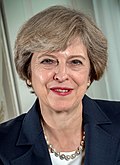2017 United Kingdom general election
general election held in United Kingdom From Wikipedia, the free encyclopedia
Remove ads
A general election was held on the 8 June 2017 to elect all 650 members of the House of Commons of the United Kingdom. It ended in a hung parliament, with the Conservative Party winning the most seats. They made a confidence-and-supply agreement with the Democratic Unionist Party so they could pass a vote of no confidence. Theresa May stayed as prime minister.[2]
Remove ads
Labour won a lot of seats from the Conservatives. This was the first time Labour had gained seats since 1997. The election happened because Parliament voted for a snap election after the 2016 Brexit referendum.[3]
Remove ads
Date
The next general election was due to be held on 8 May 2020. Theresa May announced on 18 April 2017 that she wanted it to be held on 8 June .[4] The House of Commons voted in favour of this proposal on 19 April 2017[4] allowing the election to take place in June 2017.
Results
Exit poll
BBC News, ITV and Sky News all released an exit poll at 10pm. This poll predicted the Conservatives would be the largest party but lose their majority. Exit poll results:
- Conservative Party - 314
- Labour Party - 266
- Scottish National Party - 34
- Liberal Democrats - 14
- Plaid Cymru - 3
- Green Party - 1
- UK Independence Party - 0
- Others - 18
Final results
The final results were very similar to the exit poll.
- Conservative Party - 317 (down 13 seats)
- Labour Party - 262 (up 30 seats)
- Scottish National Party - 35 (down 21 seats)
- Liberal Democrats - 12 (up 4 seats)
- Plaid Cymru - 3 (no change)
- Green Party - 1 (no change)
- United Kingdom Independence Party - 0 (down 1 seat)
- Others - 18
When the election was called the Conservative Party had a big lead in the polls and they were expected to win by a landslide. As the campaign went on the Labour Party closed the gap in the polls and the Conservatives lost their majority in the House of Commons.[5]
Important MPs who lost their seats include former Deputy Prime Minister Nick Clegg, former First Minister of Scotland Alex Salmond and The leader of the SNP in the House of Commons Angus Robertson.
Remove ads
Notes
- Given that Sinn Féin MPs do not take their seats and the Speaker and deputies do not vote, the number of MPs needed for a majority is, in practice, slightly lower. Sinn Féin won 7 seats, meaning a practical majority requires at least 320 MPs.
- Nicola Sturgeon sits as an MSP in the Scottish Parliament for Glasgow Southside. Before the election, the SNP delegation to the House of Commons had been led by Angus Robertson, MP for Moray, who lost his seat. Ian Blackford, MP for Ross, Skye and Lochaber, succeeded him.
References
Wikiwand - on
Seamless Wikipedia browsing. On steroids.
Remove ads





